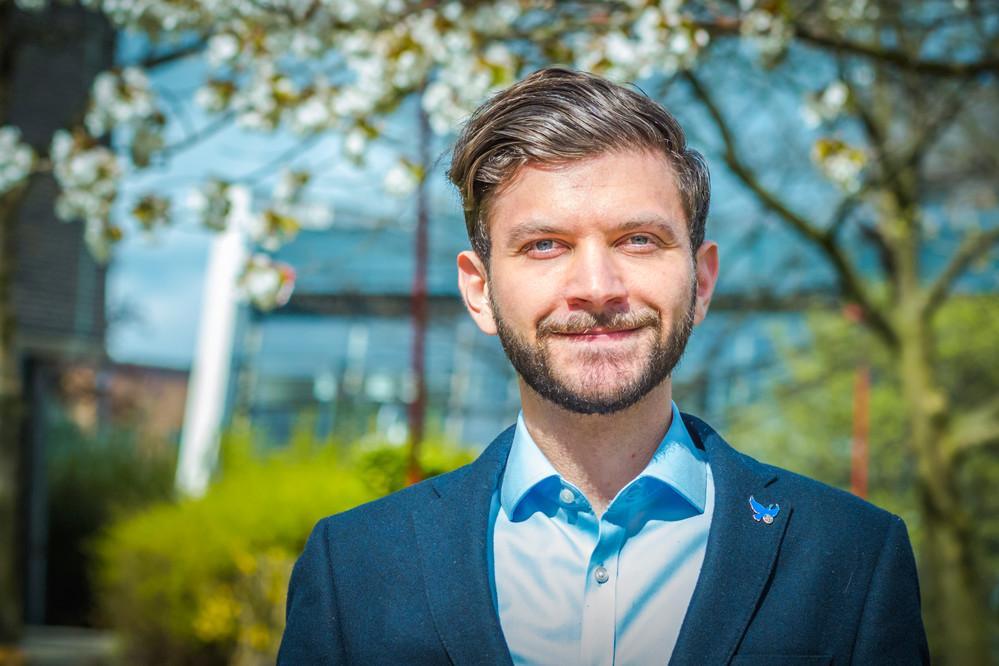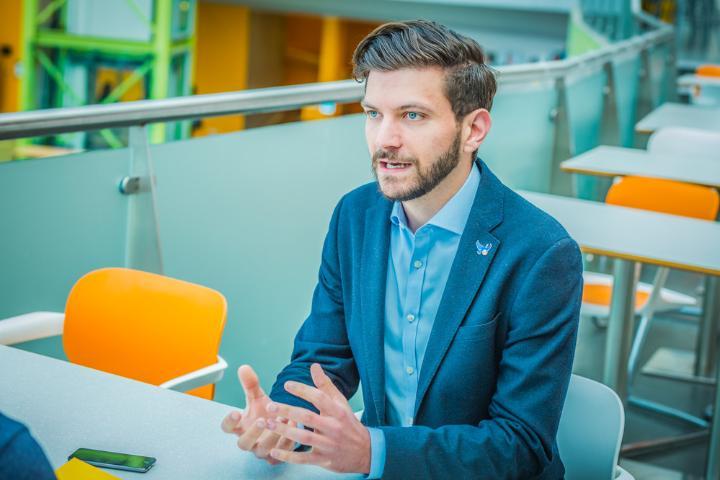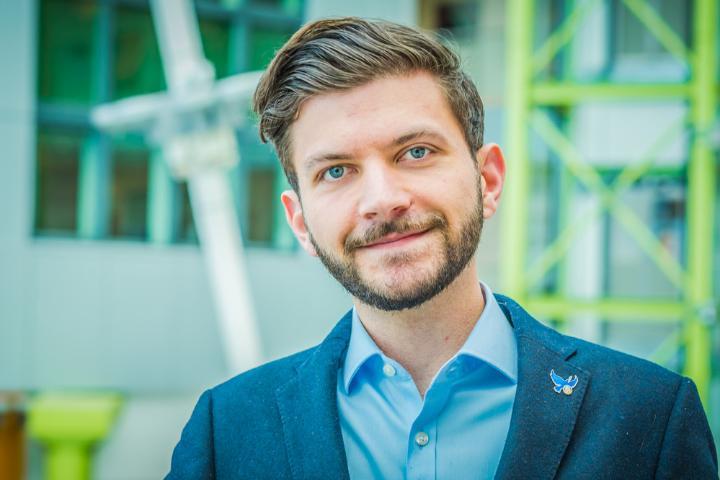Will
MA Conflict Resolution (Rotary)
- From North Carolina
- Selected as a Rotary Peace Fellow
- Researching the potential of spoken word poetry education for men's violence prevention

What made you apply for the Rotary Peace Fellowship at Bradford?
I grew up in North Carolina, and there’s a Rotary Peace Centre in North Carolina at Duke University in UNC Chapel Hill, so I was familiar with Rotary Peace Fellowships.
One of my first mentors in the peace studies and conflict resolution field was a man named Arthur Romano, and he was a Rotary Peace Fellow at the University of Bradford some 10 years before I was. He played a really critical role as a mentor in my life, both personally and professionally, and he always spoke really highly of Bradford; that it was an amazing community, it was a great academic experience, and it was a moment in his life that really helped transform his career path - so Bradford was definitely on my radar.
When I was thinking about going back to school the Rotary Peace Fellowship was one of the top opportunities I was seeking, and when I looked at the Rotary Peace Centres around the world Bradford seemed like the best fit.
What was it that made you want to return to education?
I graduated from the University of North Carolina in 2011 and I worked in various arts education and violence prevention education roles, did a little journalism, some performance work. I found a lot of salience in the classroom, and felt like that was my purpose and my calling. I did a lot of work but I never had time to step back, to think and reflect and refine my ideas.
I felt like going back to school was an opportunity for me to pause the work and really focus on ‘what is it I’m doing that’s working?’ and what am I doing that isn’t working? How can I be better, how can I be more impactful? Ultimately in peace studies and conflict resolution it’s not good enough to just try hard, it’s not good to enough to just have good intentions; we have to make sure that the work we’re doing is actually impactful and the work we are doing is actually creating the changes we want to see.
Coming back to school and doing a masters as a Peace Fellow at the University of Bradford was an incredible opportunity for me to pause, to think, to reflect and ultimately to learn and grow, and to make sure that my intent was aligned with the impact I wanted to have.

Did your studies give you what you were looking for?
Absolutely – I had a phenomenal experience as a student here at the University of Bradford. I think Bradford does a really great job of balancing theory and practice, and giving the students the opportunity to pause, reflect and refine ideas – and then immediately start practising those ideas.
As a Peace Fellow I had the opportunity to travel , to go to Australia to work with their UN Women National Committee, to go to Cambridge and do research in the middle of programme, and then come back and apply that knowledge to my dissertation. It was a crucible for me at a really pivotal moment in my life.
What did you focus on in your dissertation?
It was the precursor for the research that I’m going to be doing at Cambridge, which was examining the potential role of spoken word poetry education as an asset to men’s violence prevention education.
My dissertation mapped the challenges and limitations of men’s violence prevention education, and the opportunities of spoken word poetry education – and then saw there was alignment between those opportunities and challenges.
What makes poetry an effective medium to get your message across?
Poetry for me is an opportunity to engage, to effect and affect people – to challenge and to engage the mind and the heart. Poetry is a beautiful form of communication but it’s also a powerful one, a purposeful form of communication – strategic, refined, creative communication.
When I bring a poetic lens to my education work or my conflict transformation work it gives me an opportunity to engage people on a really deep, personal and human level in a fairly quick way. That’s a real skill and asset, and it’s why I’m interested in the educational component of it – while being an artist is great and a wonderful life, I’m much more interested in being an arts educator, helping young people around the world to use that power of creative communication to transform their own lives and their communities.

What would be your ideal role when you finish your research?
Ideally I see it split between two roles – I’m interested in being a scholar and a practitioner and I would love to continue to research at the edges of our knowledge around education and peace, poetry, and men’s violence prevention – and I would love to teach in those areas. But I’m also really invested in education policy reform, and so I’d like to figure out a way to balance that role of a scholar-practitioner with that of someone who is invested in fundamentally changing some aspects of the way we engage education in our public systems.
I’m particularly interested in trying to bring forth the conversation that gender equality education and men’s violence prevention education should be core subjects, core focuses, that we engage learners in – the same way that we value math and history and science I think we must also value peace and conflict transformation and gender equality, because I believe the majority of us want to live in a society where all of those things are practised and valued.
If we value them then we must teach them, so we need to figure out creative and effective ways to infuse these subjects into core education; I can do that as an educator myself, but I also understand from a structural standpoint that if I want to have large scale impact I need to understand how these policies are crafted, and hopefully be one of the people at the table that is offering alternatives and new ideas.
Do you think your MA at Bradford gave you the tools you need to make the structural changes you want to see?
It was one of the main benefits for me; when you’re out there running the classes, running the non-profits it’s very easy to get lost and think ‘I have too many things to do and not enough time, so I’ve just got to keep my head down and keep working as hard as I can’.
Stepping out and coming into such the incredible, diverse and rich academic environment at the University of Bradford, where I was learning from students and professors from all around the world, showed me that yes I need to keep working in the classroom, but I also need to have a multi-layered approach if I actually want to create systemic and lasting change. For me that looks like teaching, research and policy implications.
Now your time at Bradford is coming to an end, what stands out as a highlight?
It's the relationships and the people. Something that really attracted me to the programme here at Bradford was the size of the programme and the incredible diversity - the real multi-dimensional diversity in terms of age, nationality, religion, gender, professional interest.
When I think about my time at Bradford I recall all the conversations I had, whether they be with professors or with students around a table at a pub down the street, and recall thinking this is incredibly rare and incredibly valuable. To be able to constantly engage with people from multiple continents, all of whom have a fairly refined common purpose of wanting to make the world a better place, wanting to make the world more peaceful and resolve conflicts. To know I can walk into the Pemberton Building on any given day and know that I will find colleagues there, that I will find allies, I will find friends, I will find people I’d like to work with again one day – those relationships, those connections are what stand out.
